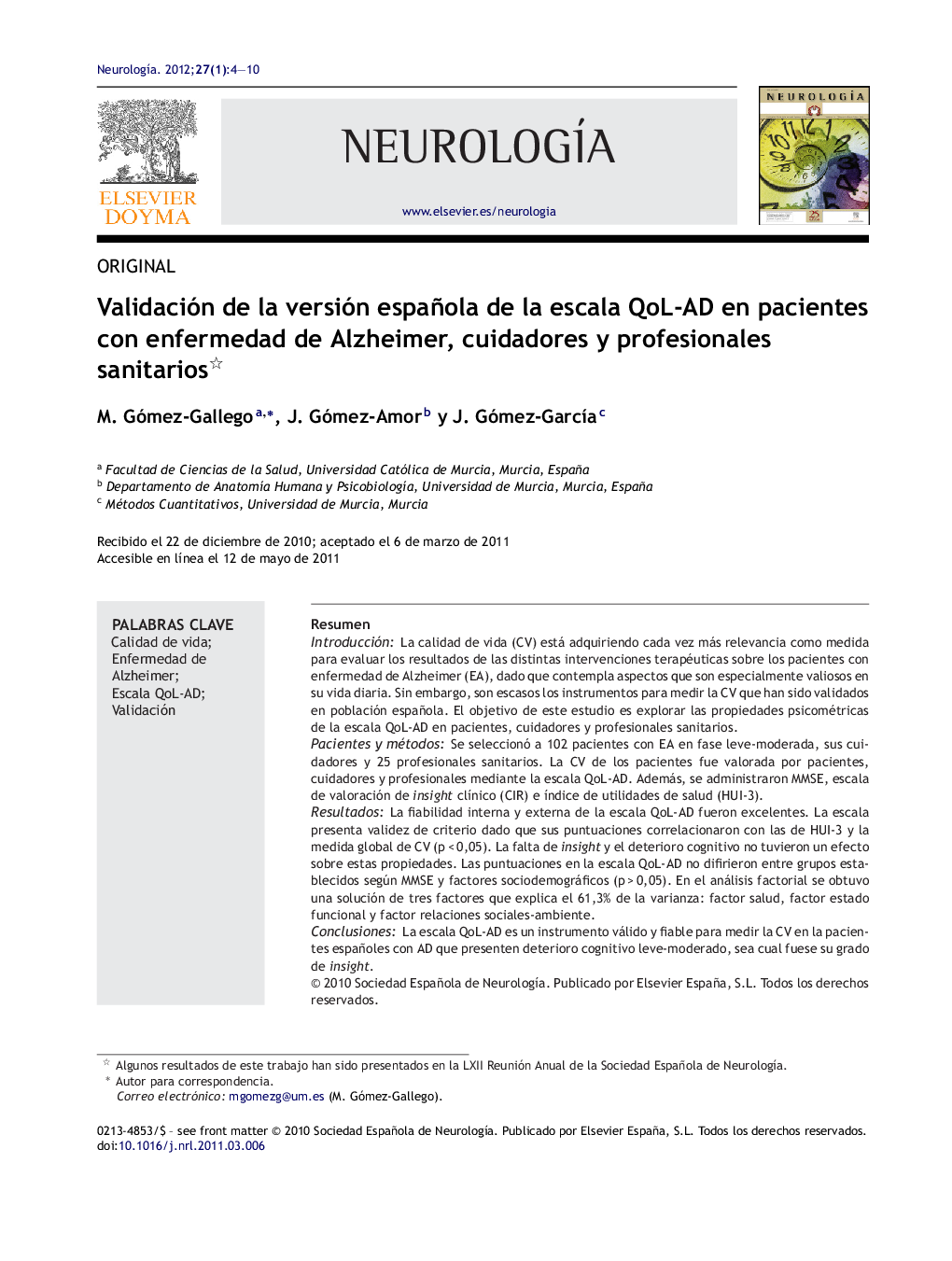| Article ID | Journal | Published Year | Pages | File Type |
|---|---|---|---|---|
| 3076251 | Neurología | 2012 | 7 Pages |
ResumenIntroducciónLa calidad de vida (CV) está adquiriendo cada vez más relevancia como medida para evaluar los resultados de las distintas intervenciones terapéuticas sobre los pacientes con enfermedad de Alzheimer (EA), dado que contempla aspectos que son especialmente valiosos en su vida diaria. Sin embargo, son escasos los instrumentos para medir la CV que han sido validados en población española. El objetivo de este estudio es explorar las propiedades psicométricas de la escala QoL-AD en pacientes, cuidadores y profesionales sanitarios.Pacientes y métodosSe seleccionó a 102 pacientes con EA en fase leve-moderada, sus cuidadores y 25 profesionales sanitarios. La CV de los pacientes fue valorada por pacientes, cuidadores y profesionales mediante la escala QoL-AD. Además, se administraron MMSE, escala de valoración de insight clínico (CIR) e índice de utilidades de salud (HUI-3).ResultadosLa fiabilidad interna y externa de la escala QoL-AD fueron excelentes. La escala presenta validez de criterio dado que sus puntuaciones correlacionaron con las de HUI-3 y la medida global de CV (p < 0,05). La falta de insight y el deterioro cognitivo no tuvieron un efecto sobre estas propiedades. Las puntuaciones en la escala QoL-AD no difirieron entre grupos establecidos según MMSE y factores sociodemográficos (p > 0,05). En el análisis factorial se obtuvo una solución de tres factores que explica el 61,3% de la varianza: factor salud, factor estado funcional y factor relaciones sociales-ambiente.ConclusionesLa escala QoL-AD es un instrumento válido y fiable para medir la CV en la pacientes españoles con AD que presenten deterioro cognitivo leve-moderado, sea cual fuese su grado de insight.
BackgroundQuality of life (QOL) is becoming increasingly important to measure the effect of interventions on the life of patients with Alzheimer's disease (AD), particularly on the most meaningful issues. However, most of the instruments used to measure QOL have not been validated in the Spanish population. The aim of this study was to determine the psychometric properties of a Spanish version of QoL Scale in patients with AD, carers and health professionals.Material and methodsOn hundred and two patients, their carers and 25 health professionals were recruited from day centres. Patients’ QOL was rated by patients, carers and health professionals. The Health Utilities Index, Clinical Insight Rating Scale and Mini Mental State Examination were also administered.ResultsThe internal and external reliability of QoL-AD were excellent. Criterion validity was indicated by a significant correlation of QoL-AD scores with HUI-3 and QoL-AD global item scores (p < .05). Lack of insight and cognitive impairment did not have an effect on these properties. QoL-AD scores were not significantly different between groups made according sociodemographic characteristics and cognitive impairment (p > .05). The exploratory factor analysis result revealed a three factor solution, which accounted for 61.3% of variance: health factor, functional status factor, and social relationship-environment factor.ConclusionsQoL-AD Scale has proved to be a valid and reliable instrument to measure QoL of Spanish AD patients with mild-to-moderate cognitive impairment and a wide range of anosognosia.
